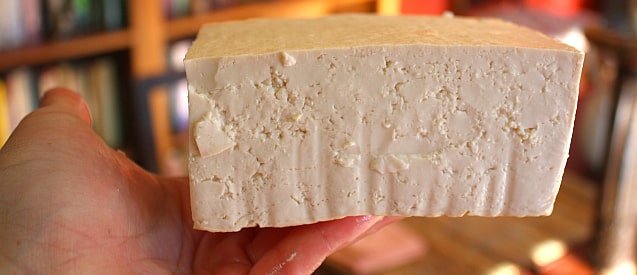If animal proteins promote cancer because they boost our blood levels of the growth hormone IGF-1, what about the few plant proteins that have amino acid ratios similar to animal proteins such soy foods? One of soy’s selling points is that it has “high quality” protein, but as I explored in my video Higher Quality May Mean Higher Risk, higher quality protein may mean a higher risk of cancer.
In my 2-min. video Animalistic Plant Proteins, I show that animal protein consumption is associated with significantly higher levels of the cancer promoter IGF-1 and non-soy plant protein is associated with significantly lower levels. There was no significant association with soy protein, though. This suggests that if all we do is replace animal protein with soy protein, we may not see as dramatic a drop in IGF-1 as that enjoyed by those replacing meat, eggs, and dairy with a variety of plant proteins. You can see what lower IGF-1 levels can mean for prostate and breast cancer growth in my videos Ex Vivo Cancer Proliferation Bioassay and The Answer to the Pritikin Puzzle.
In my 3-min. video Too Much Soy May Neutralize Benefits, I show that vegans consuming the equivalent of 7-18 servings of soy foods per day may end up with circulating IGF-1 levels comparable to those who eat meat. For more on the cancer reversal study mentioned in the video, see Cancer Reversal Through Diet. It’s important to remember in this discussion that soy food consumption is associated with an array of health benefits. See, for example The Effect of Soy On Precocious Puberty. But how much may be too much?
It seems that 7 to 18 servings of soy a day may neutralize some of the beneficial effects of avoiding animal protein. At the same time, studies have repeatedly found that women who eat a lot of soy appear to have a lower risk of getting breast cancer and a better chance of surviving breast cancer than those who don’t (see Breast Cancer Survival and Soy). So is there some magic number of soyfood servings we should shoot for?
In my 2-min. video, How Much Soy Is Too Much, I run through all the studies to date that have measured the effects of varying levels of soy consumption on IGF-1 levels. Five to ten servings per day increased IGF-1 levels, but two to three servings did not. The bottom-line is that legumes are one of the healthiest things we can eat and should be a part of everyone’s daily diet. This means lentils, peas, and/or beans every day—in fact, ideally every meal! Soy is an excellent choice, but we should probably stick to no more than 3-5 servings a day.
–Michael Greger, M.D.
PS: If you haven’t yet, you can subscribe to my videos for free by clicking here and watch my full 2012 – 2015 presentations Uprooting the Leading Causes of Death, More than an Apple a Day, From Table to Able, and Food as Medicine.
